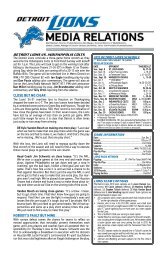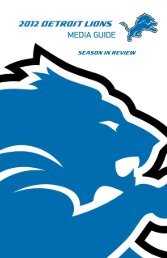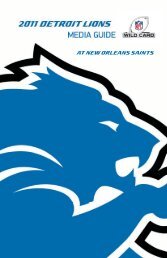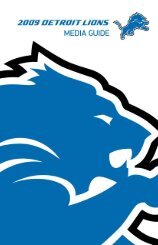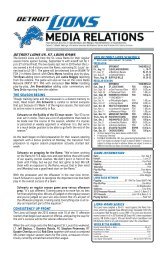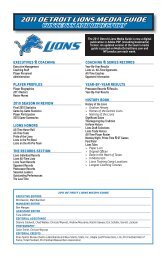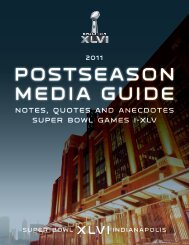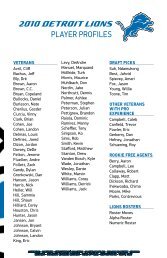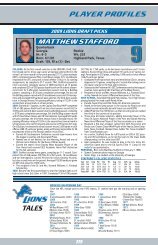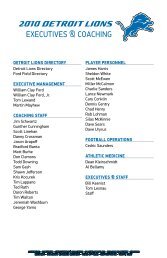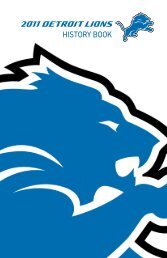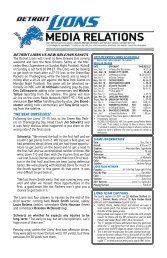Detroit Lions vs atLanta faLcons JOHNSON'S Mega-PURSUIT 2012 ...
Detroit Lions vs atLanta faLcons JOHNSON'S Mega-PURSUIT 2012 ...
Detroit Lions vs atLanta faLcons JOHNSON'S Mega-PURSUIT 2012 ...
You also want an ePaper? Increase the reach of your titles
YUMPU automatically turns print PDFs into web optimized ePapers that Google loves.
A Brief History of tHe <strong>Lions</strong><br />
<strong>Detroit</strong> welcomed the <strong>Lions</strong> in 1934, but it was not the area’s first<br />
look at professional football. in 1920, the <strong>Detroit</strong> Heralds were a charter<br />
member of the American Professional Football Association, which was<br />
the original name of the present NFL, but the club folded after two<br />
years. the <strong>Detroit</strong> Panthers appeared in 1925, but also folded after two<br />
seasons. in 1928, the <strong>Detroit</strong> Wolverines were formed, but they failed<br />
after just one year.<br />
in 1930, the then-10-year-old National Football League added a<br />
franchise from Portsmouth, ohio, called the spartans. After four seasons,<br />
the team was purchased for $7,952.08 by a group headed by <strong>Detroit</strong> radio<br />
executive George A. richards and moved to the Motor City.<br />
Playing in the University of <strong>Detroit</strong> stadium before crowds that<br />
averaged 16,000, the new <strong>Detroit</strong> <strong>Lions</strong> won the NFL Championship in<br />
only their second year (1935). Under the leadership of Coach “Potsy”<br />
Clark and stars like Hall of Famer “Dutch” Clark, Ernie Caddel, George<br />
Christensen, “Ace” Gutowsky, Glenn Presnell and “ox” Emerson, the early<br />
<strong>Lions</strong> established pro football in <strong>Detroit</strong>.<br />
in 1940, Chicagoan Fred Mandel bought the club. <strong>Lions</strong>’ stars of that<br />
era included Hall of Famers Bill Dudley and Alex Wojciechowicz, John<br />
Green, Byron “Whizzer” White, Frank sinkwich and “Camp” Wilson. the<br />
team was sold eight years later to a group of local businessmen under<br />
the leadership of Edwin J. Anderson. the <strong>Detroit</strong> syndicate controlled<br />
the club until 1964, when William Clay Ford became the sole owner for<br />
a price of $4.5 million.<br />
the <strong>Lions</strong> dominated the NFL in the 1950s with four division titles<br />
and three league championships. Under the direction of head coach<br />
Buddy Parker, the team won back-to-back world crowns in 1952-53,<br />
defeating Cleveland on both occasions. stars of those powerful teams<br />
were Hall of Famers Bobby Layne, Jack Christiansen, Doak Walker and<br />
Lou Creekmur, as well as Les Bingaman, Cloyce Box, Leon Hart and Bob<br />
Hoernschemeyer. the <strong>Detroit</strong>-Cleveland battles of the era were classic<br />
confrontations between two giants of the blossoming NFL.<br />
since their last title in 1957 under the coaching of George Wilson,<br />
the <strong>Lions</strong> have continued searching for the league’s top spot. such<br />
performers as Joe schmidt, yale Lary, Dick “Night train” Lane, John<br />
Henry Johnson and Lem Barney have been elected to the Hall of Fame.<br />
outstanding players such as Wayne Walker, Mike Lucci, Nick Pietrosante,<br />
roger Brown, terry Barr, Mel Farr, Charlie sanders, Dexter Bussey, Billy<br />
sims and Doug English have also taken their places in the annals of<br />
pro football in <strong>Detroit</strong>.<br />
in 1967, schmidt began the first of six seasons as head coach of the<br />
<strong>Lions</strong>. His 1970 team made the playoffs, (first postseason trip since ’57)<br />
but lost in the first round to Dallas by the baseball-like score of 5-0.<br />
Prior to the 1975 season, the <strong>Lions</strong> moved into a new, domed<br />
stadium in Pontiac, Mich., a suburb located 30 miles north of <strong>Detroit</strong>. the<br />
silverdome was, at one time, the world’s largest air-supported domed<br />
structure and seated over 80,000 spectators under a fiberglass roof.<br />
Monte Clark took control of all football operations as head coach<br />
in 1978. Under Clark’s direction, the <strong>Lions</strong> narrowly missed playoff<br />
berths in 1980-81, before qualifying in 1982 — the <strong>Lions</strong>’ first playoff<br />
appearance since 1970. <strong>Detroit</strong> captured the NFC Central Division crown<br />
in 1983, but stumbled in the first round of the playoffs with a 24-23 loss<br />
at san Francisco.<br />
Darryl rogers took over for Clark in 1985 but was replaced on an<br />
interim basis by his defensive coordinator Wayne Fontes in November<br />
1988 after rogers’ teams had posted a combined 18-40 record. Fontes<br />
was officially named the franchise’s 18th head coach on December<br />
22, 1988.<br />
the <strong>Lions</strong> “restored the roar” in 1991, winning a franchise-record 12<br />
regular season games. riding a tide of emotion after guard Mike Utley’s<br />
paralyzing neck injury, <strong>Detroit</strong> defeated Dallas, 38-6, in the <strong>Lions</strong>’ first<br />
silverdome playoff contest. the victory gave the <strong>Lions</strong> a berth in the<br />
NFC Championship Game, where <strong>Detroit</strong> fell to the eventual super Bowl<br />
Champion Washington redskins.<br />
the <strong>Lions</strong> finished 10-6 in 1993 en route to capturing the NFC Central<br />
Division title, and earned a Wild Card playoff bid in 1994. the 1995 <strong>Lions</strong><br />
featured the NFL’s top-rated offense and won their final seven games to<br />
earn a third straight playoff berth. Herman Moore set an NFL record with<br />
123 catches, and he and Brett Perriman became the first teammates to<br />
each total over 100 catches in the same season. the receiver tandem<br />
also set the NFL record for most receiving yards in a season. Quarterback<br />
scott Mitchell set team passing records for yards (4,338), completions<br />
(346) and touchdowns (32).<br />
in 1996, running back Barry sanders captured his third NFL rushing<br />
title with a dramatic 175-yard outburst on the final Monday night of the<br />
season in san Francisco. the <strong>Lions</strong>, however, finished a disappointing 5-11<br />
History Book<br />
<strong>Detroit</strong>lions.com<br />
Media.<strong>Detroit</strong>lions.com<br />
in ’96 and following the season, Fontes was replaced as head coach<br />
by former san Diego Chargers’ head coach, Bobby ross. Fontes,<br />
who was the head coach for more than eight full seasons, finished<br />
his career as the team’s all-time leader among head coaches in<br />
both wins (67) and games coached (138).<br />
ross was named the 19th head coach in team history January<br />
13, 1997, and led the club back to the playoffs in his inaugural<br />
year at the helm with a 9-7 record. that season, sanders, who<br />
was inducted into the Hall of Fame in August 2004, continued<br />
his storybook career by becoming only the third player in league<br />
history to record 2,000 yards rushing in a single-season (2,053)<br />
and he reeled off an NFL record 14 consecutive 100-yard outings<br />
to finish the season.<br />
the <strong>Lions</strong> closed out the 1990s reaching the playoffs for the<br />
sixth time in the 10-year span, which is a franchise record for<br />
playoff appearances during a decade. <strong>Detroit</strong>’s playoff berth in<br />
1999 marked the second time in ross’ first three years as head<br />
coach that he led the <strong>Lions</strong> into the postseason. the last <strong>Lions</strong>’<br />
head coach to accomplish that feat was Buddy Parker in 1952-53<br />
during his second and third seasons at the helm.<br />
After playing nine games into the 2000 season and compiling<br />
a 5-4 record, ross abruptly resigned as head coach November 6<br />
and was immediately replaced by Gary Moeller. Moeller guided<br />
the team to a 4-3 record over the last seven games, but narrowly<br />
missed the playoffs with a loss to the Chicago Bears in the season<br />
finale. Following the season, William Clay Ford named Matt<br />
Millen president and CEo, and he assumed control over team<br />
operations. on January 25, 2001 Gary Moeller was replaced as<br />
head coach by former san Francisco 49ers offensive coordinator<br />
Marty Mornhinweg.<br />
on April 1, 2002, <strong>Detroit</strong> relocated the team’s day-to-day<br />
operations into the new $36 million Headquarters and training<br />
Facility in Allen Park. the new complex features outdoor and indoor<br />
practice fields, spacious training and meeting rooms and even the<br />
team’s own broadcast studio.<br />
A new era in <strong>Lions</strong>’ history dawned as Ford Field, the team’s<br />
$500 million downtown <strong>Detroit</strong> stadium, opened its doors in August<br />
2002. the 65,000-seat stadium sparkled as its retro and innovative<br />
features glistened in the national spotlight as the premiere sports<br />
and entertainment complex. the <strong>Lions</strong> played the first game at Ford<br />
Field August 24, 2002 in a preseason tilt against the Pittsburgh<br />
steelers. the inaugural regular season game was played between<br />
the <strong>Lions</strong> and the Green Bay Packers september 22, 2002.<br />
in January 2003, Mornhinweg was fired after two seasons and<br />
former san Francisco 49ers Head Coach steve Mariucci was tabbed<br />
the new <strong>Lions</strong>’ head coach February 4.<br />
For the first time since the <strong>Lions</strong> placed the Leaping Lion<br />
logo on the players’ helmets in 1961, <strong>Detroit</strong> announced a major<br />
addition to the team’s uniform on April 23, 2003. the <strong>Lions</strong>’<br />
classic uniform was enhanced with black trim on the logo, jerseys<br />
and pants, along with black shoes and black facemasks. in April<br />
2005, the team introduced an alternate black jersey that would<br />
be worn through 2007.<br />
on November 28, 2005, steve Mariucci was relieved of his duties<br />
as head coach and defensive coordinator Dick Jauron was named<br />
interim head coach for the remaining five games.<br />
in 2006, the <strong>Lions</strong> hired rod Marinelli as the team’s 24th head<br />
coach, a position he would hold through 2008.<br />
in 2008, the <strong>Lions</strong> commemorated the franchise’s 75th season<br />
in <strong>Detroit</strong>. Just a handful of NFL teams have been around as long<br />
as the <strong>Lions</strong>, a franchise that spans several generations of fans<br />
over the years. <strong>Detroit</strong> has called three different stadiums home<br />
with nearly 1,400 players seeing action on a given gameday and<br />
numerous coaches strolling the sideline. that history is rich with<br />
great players who have donned the uniform -- the <strong>Lions</strong> are one<br />
of only nine teams to have at least 18 Pro Football Hall of Fame<br />
players don their respective uniforms -- and with traditions like<br />
the “Honolulu Blue and silver”, the leaping Lion logo, the “roaring<br />
20’s” and the team’s annual thanksgiving tradition.<br />
With 78 years now in the rear-view mirror, <strong>Detroit</strong> is surging<br />
ahead in a new era of <strong>Lions</strong> football. in 2009, for the first time in<br />
team history, the team entered the season with a new president,<br />
tom Lewand, a new general manager, Martin Mayhew, and a new<br />
head coach, Jim schwartz, hired January 16, 2009. together, they<br />
have been the driving force for the team’s success on and off the<br />
field. in that same year, the <strong>Lions</strong> introduced a new logo and new




